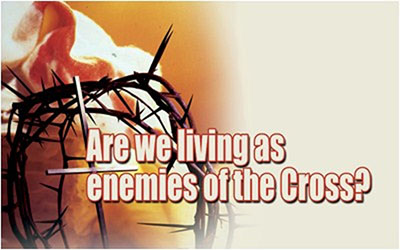The Narrow Path
13Enter through the narrow gate. For wide is the gate and broad is the road that leads to destruction, and many enter through it. 14But small is the gate and narrow the road that leads to life, and only a few find it (Matthew 7:13-14).
(Bấm vào đây để đọc tiếng Việt)
 According to most common interpretations, the narrow gate, or path, denotes troubles and challenges awaiting those who choose to embark on it. However there is curiously a paradoxical expectation that the life of a good Christian is filled with God’s blessings, especially material blessings, great financial rewards and a vibrant family life; a projection of God’s goodness to those who belong to Him as a testimony to the unbelieving world. But there is nothing in the immediate context of these verses that warrants such interpretations, of promises of either difficulties or smooth sailings. Yet this is what one often hears from pulpits everywhere across the entire spectrum.
According to most common interpretations, the narrow gate, or path, denotes troubles and challenges awaiting those who choose to embark on it. However there is curiously a paradoxical expectation that the life of a good Christian is filled with God’s blessings, especially material blessings, great financial rewards and a vibrant family life; a projection of God’s goodness to those who belong to Him as a testimony to the unbelieving world. But there is nothing in the immediate context of these verses that warrants such interpretations, of promises of either difficulties or smooth sailings. Yet this is what one often hears from pulpits everywhere across the entire spectrum.
Common interpretations/contradictions
Sufferings
In accordance with common interpretations, one is warned of a hard life that is expected of those who follow Christ. We were warned of persecutions from the enemies of the cross, we were advised to be ready to make many sacrifices, to forsake any thoughts of a comfortable life, or of privileges. And if “the Son of Man has no place to lay his head (Luke 9:58)” who are we to expect any better? Suffering seems to be the underlying theme in most if not all sermons, and virtually all religions of the world as well. Some price has to be paid, some work has to be performed so there might be gain, and since there cannot be something that comes from nothing, so it is with salvation, there must be some suffering as a prerequisite.
Blessings
Interestingly in the same Sunday worship service, folks are encouraged to share their blessings. The more the blessings, the more proofs of their being right with God. Blessings such as successful children, healing of diseases, jobs found, babies born, protection from a near fatal automobile accident, miraculous divine intervention, answered prayers, and myriad accounts that validate one’s good standing with God.
The contradictions
Has something changed? Do sermons actually prepare folks for a hard life ahead, or do they promise folks of an easy life once they enter the faith? Damned if you do and damned if you don’t. Forget about messages you hear of the virtue of suffering, you feel cursed if your life is filled with adversities. Wasn’t this what happened to Job? Or the assumptions people made of the man blind since birth?
Outside of the Christian circles, people who share common troubles actually find in their support groups the comfort of knowing they’re not alone, yet within the supposedly loving body of Christ, they feel like outcasts. It’s not that they are actually condemned by their fellow believers, but it is because they feel a condemnation within their own souls due to conflicting messages they’ve heard over the years.
The Kingdom of God
Without a firm and sound foundation of biblical understanding of how God accepts and saves them, the believers base their relationship with God entirely on their circumstances. Instead of rejoicing in their adversities, they engage in morbid introspection to try to figure out what they’ve done wrong, whether they’ve failed God somehow. Instead of treading lightly while receiving God’s blessings with open hands, knowing deep in their hearts that it was due to God’s grace and mercies toward them, they either brag or judge those who are going through difficulties. The book of Job and the story of the man blind since birth are demonstrations of this type of thinking.
That is the root of the problem. If salvation, or justification, is based on performance, on works, or on personal merit, so it is with everything else. How we approach the kingdom of God will inevitably color the lenses through which we make our evaluations. Matthew 6:33 says “Seek first the Kingdom of God and His righteousness, and all these things will be added unto you,” Yet so much bandwidth is dedicated to “all these things,” where all these things include supposedly noble endeavors such as ministries, evangelism, prayers, Bible studies, giving to the poor, parenting, overcoming addictions, peer pressure, and tons of other how-tos. But as good as “all these things” are, they’re not part of the Kingdom of God and His righteousness, they’re still on this side of eternity. As a matter of fact, the Lord had revealed to Isaiah that they’re but “filthy rags.”
Who can really know the true meaning of the Kingdom of God and His righteousness? The only people who know what the Kingdom of God is like are those who have entered it; the rest are people on the outside speculating about things they do not know.
God’s righteousness
The only people who can enter the Kingdom of God are those who are deemed righteous by God. And yet it’s not their own righteousness, but the righteousness of God that is bestowed on them. And how is it bestowed on them? Not by works, but by faith. Since it’s entirely by God’s grace and mercies upon them that they enjoy this righteousness, they don’t have to wait; God has already called Himself their Father and them His children. Since their heavenly inheritance is not at all dependent on them, but on the finished work of Christ, they have become alive again like when God gave the Holy Spirit to mankind at the beginning of creation. These people are already inside the Kingdom of God. They know what they’re talking about.
Who are still outside? These are the people who depend on the works of the law to make their faith perfect. What the law does is it reminds them of their sins. It creates a formidable barrier between them and God because:
For no one can ever be made right with God by doing what the law commands. The law simply shows us how sinful we are. (Romans 3:20 — NLT)
Their works are never over. The law instead of giving them the righteousness they need to enter God’s kingdom, it drives them further from God because it magnifies their sins like the giants in the promised land. Therefore by definition those who depend on the works of the law cannot possibly know God or His kingdom.
Narrow vs. broad
God allows no means of access to Him other than His own provision: Jesus Christ. He said this in John 14:6:
I am the way, and the truth, and the life. No one comes to the Father except through me.
The world has always tried to access God through their own efforts, through works of various laws, but Jesus shows them a very narrow path: trusting in the finished work of Christ. That’s how narrow it is. It’s not narrow because of troubles or difficulties, but because of how God defines it. For those who depend on their works, the path is broad in the sense that each one is on their own lane, each one defines their own way how to access God, because each person’s work is different from another’s. It’s a broad path with infinite opportunities to get lost.
Deadly misinterpretation
By defining the narrow path as a difficult road, people change its meaning from grace to works, from the singular trust in Christ to the myriad possibilities of man’s efforts, from the assurance of salvation to the uncertainty of random choices to meet arbitrary man-made standards.
The true narrow path is in fact the easiest one as it is straight and narrow with no deviations or detours, it leads straight from captivities to the promised land. On it, God takes us home on wings of eagles (Exodus 19:4).
However this narrow path may prove difficult to those who walk by the flesh—keep in mind that it is not about falling into sinful temptations, but about using fleshly efforts to draw near to God—. As this article attempts to show that the difficulties lie not in trying circumstances, but in the choice that one makes. Those who rely on the law, or the works of it, or the obedience of the flesh, have much to lose like the rich young ruler who met Jesus in Matthew 19:16-22. Without works as their trophies they cannot boast from their self righteousness.
Great accountability lies with the handlers of Scriptures. How have you interpreted biblical concepts such as “the narrow path” to those who sit under your pulpits? Are you helping folks to, or preventing them from, entering the Kingdom of God?
Nghi Nguyen
- Scripture quoted by permission. All scripture quotations, unless otherwise indicated, are taken from the NET Bible® copyright ©1996-2006 by Biblical Studies Press, L.L.C. All rights reserved.
Disclaimer: This is my own opinion on the topic, which does not necessarily reflect the church's theology, or beliefs of the individuals in it — Nghi Nguyen

